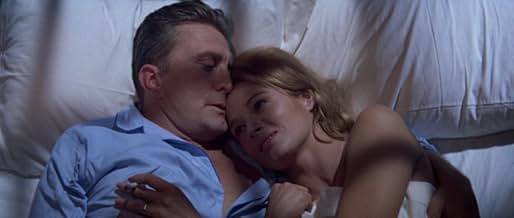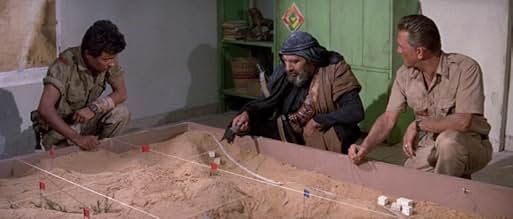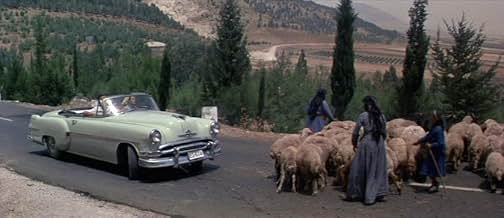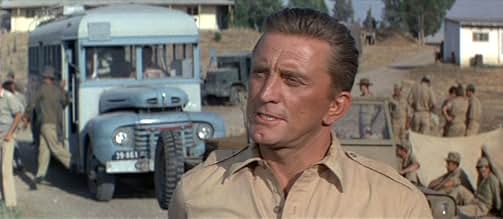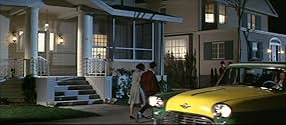En 1947, tras la decisión de la ONU de dividir la Palestina británica en estados judíos y árabes separados, un antiguo oficial del ejército estadounidense es reclutado por los judíos para re... Leer todoEn 1947, tras la decisión de la ONU de dividir la Palestina británica en estados judíos y árabes separados, un antiguo oficial del ejército estadounidense es reclutado por los judíos para reorganizar la Haganá.En 1947, tras la decisión de la ONU de dividir la Palestina británica en estados judíos y árabes separados, un antiguo oficial del ejército estadounidense es reclutado por los judíos para reorganizar la Haganá.
- Dirección
- Guionistas
- Elenco
- Dirección
- Guionistas
- Todo el elenco y el equipo
- Producción, taquilla y más en IMDbPro
Opiniones destacadas
Kirk Douglas stars as Mickey Marcus perhaps chosen due to the character's similarities to another historical figure forced by circumstances into leadership, Spartacus, whom Douglas had portrayed in 1960. He's supported by an eclectic cast which includes Angie Dickinson as his neglected(!) wife, Senta Berger as the Israeli girl he falls for, Topol as an ill-tempered Arab sheik, Luther Adler as a local politician, a plethora of reliable British character actors and even guest appearances by Frank Sinatra (which doesn't amount to much), a glum Yul Brynner as a fellow freedom fighter, and John Wayne as a U.S. General whom Douglas initially falls foul of but the two eventually end up respecting one another (still, seeing Wayne at the liberation of the Dachau concentration camp is about as incongruous as his stint playing the Roman Centurion at Christ's crucifixion in THE GREATEST STORY EVER TOLD [1965]!).
Despite a sharp script and good individual sequences, the film is compromised by its necessity to be both a spectacle and a message picture (the WWII flashbacks, for instance, are unnecessary and merely render the film overlong); unsurprisingly, it works best during the action highlights (complemented by a typically fine Elmer Bernstein score). Apparently, the events have been partially fictionalized I wonder whether these embellishments concerned the romantic complications and the Hollywood-style ironic ending. For the record, Shavelson had started out as a scriptwriter (and later director) of Bob Hope and Danny Kaye vehicles; this was his most serious effort a brave try, but not quite the 'giant' film he clearly intended...
The script tells us things that most of us already know, without adding much that we didn't. Thankfully it avoid extensive shots of the death camps. If anyone needs to be told about that, he's hopelessly benighted anyway. That mass genocide was perhaps the most horrible expression of the baser impulses of human nature, and like any transcendental event should be treated with caution, not with an eye to the box office.
Still, the dialog is flat and ordinary. Giant closeups of faces telling us important things -- "For the first time, I've realized I'm a Jew" -- doesn't really help. It's like being hit over the head by someone wielding a crowbar and yelling -- "GET IT? GET IT?" Yes, we get it. Stop already.
Kirk Douglas isn't bad. In fact he's pretty good, outdone only by Topol as an Arab sheyk -- "I course your Faddair." Cheese, Topol is good. And so is his role. He plays "The Sheik of Arabie" on a Victrola and rolls his eyes with glee.
John Wayne's performance is perfunctory and so is Frank Sinatra's, but the latter's involvement is interesting. At one point in the film he protests, "Don't leave me alone -- I'm anti-Semitic." Far from being anti-Semitic he was, let's say, pro-Semitic. Like a lot of recent immigrant families in the Northeast his had a keen eye for the strengths and weaknesses of ethnicity, and Sinatra plumped for the strengths in Judaism. He envied and admired Jews for their family values and their solidarity, and even learned to read a little Hebrew. A scene in which he spurts seltzer water at an attacking Arab fighter is beneath comment.
Overall the film is not a success because it doesn't spell out in any detail exactly what Mickey Marcus actually DID for the Israelies. It won't do to have two minutes of Marcus telling them "Attack! Attack!," when ten times that amount is spent on an unconvincing adulterous affair with Senta Berger -- not that having such an affair with such a magnificent woman would be a blot on anyone's escutcheon. (I could never spell that word. It means "shield".) I guess it's worth watching once, just to remind us of a part of history that some of us have not bothered to look into. As a film, (shrug).
For what it's worth most of the weapons were realistic, the Jordanians were equipped with the proper British arms; SMLEs and Vickers and Bren guns. I'd liked to have seen Glubb Pasha.
The story goes back and forth between sappy and inspired. The scene where the Israelis declare their independence brought tears to my eyes but I'm notorious for the manly tear.
¿Sabías que…?
- TriviaMichael Douglas' uncredited role (and theatrical movie debut) came about when an Israeli actor refused to perform a driving stunt, claiming it was too dangerous. Kirk Douglas, trusting his son's skill as a driver, enlisted Michael to fill in on the spot.
- ErroresWhen first seen, Angie Dickinson and Senta Berger are shown wearing fashions from the 1960s when the film was made, not the 1940s when the film was set.
- Citas
Col. David 'Mickey' Marcus: Why do you let women to go on these convoys?
Asher Gonen: Magda volunteered.
Col. David 'Mickey' Marcus: She's been through enough. She just lost her husband, she's in a terrible st...
Asher Gonen: Look, we need everyone. Especially since the British search us for weapons. Being British, they're also too polite most of the time to search a woman thoroughly.
Col. David 'Mickey' Marcus: You're lucky you're not occupied by the French.
- Créditos curiososThe major events in this film actually happened. Some of them are still happening. The major characters actually lived. Many of them are still living. Although it was not easy.
- ConexionesFeatured in Hollywoodism: Jews, Movies and the American Dream (1998)
- Bandas sonorasNext Year in Jerusalem
Music by Dov Seltzer
Selecciones populares
- How long is Cast a Giant Shadow?Con tecnología de Alexa
Detalles
- Tiempo de ejecución2 horas 26 minutos
- Relación de aspecto
- 2.35 : 1
Contribuir a esta página



